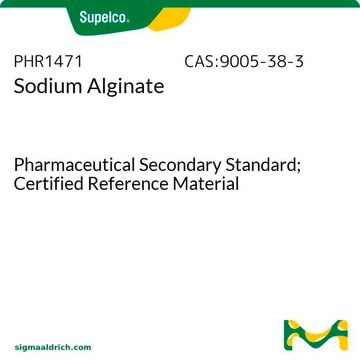H6512
Heparinase II from Flavobacterium heparinum
Lyophilized powder stabilized with approx. 25% bovine serum albumin, lyophilized powder, ≥100 units/mg protein (enzyme + BSA)
Synonym(s):
Heparin lyase II
About This Item
Recommended Products
biological source
bacterial (Flavobacterium heparinum)
Quality Level
conjugate
conjugate (Glucosaminoglycan)
form
lyophilized powder
specific activity
≥100 units/mg protein (enzyme + BSA)
mol wt
84.1 kDa
storage temp.
−20°C
General description
Application
- for digestion of heparin sulfate during exosome isolation
- for digestion of heparin sulfate in notochordal cell conditioned media (NCCM) to investigate the content of glycosaminoglycans in NCCM
- as a component of digestion buffer during cell surface glycan processing
- as a component of heparin lyase (HSase) mix to remove the heparin sulfate on the 293ͰT/ACE2 cell surface and study the effect of histones on the infectivity of pseudovirus
Biochem/physiol Actions
Unit Definition
Other Notes
Storage Class Code
11 - Combustible Solids
WGK
WGK 3
Flash Point(F)
Not applicable
Flash Point(C)
Not applicable
Personal Protective Equipment
Choose from one of the most recent versions:
Certificates of Analysis (COA)
Don't see the Right Version?
If you require a particular version, you can look up a specific certificate by the Lot or Batch number.
Already Own This Product?
Find documentation for the products that you have recently purchased in the Document Library.
Customers Also Viewed
Articles
Uncover more about glycosaminoglycans and proteoglycans including the structure of glycosaminoglycans (GAGs), the different types of GAGs, and their functions.
Uncover more about glycosaminoglycans and proteoglycans including the structure of glycosaminoglycans (GAGs), the different types of GAGs, and their functions.
Uncover more about glycosaminoglycans and proteoglycans including the structure of glycosaminoglycans (GAGs), the different types of GAGs, and their functions.
Uncover more about glycosaminoglycans and proteoglycans including the structure of glycosaminoglycans (GAGs), the different types of GAGs, and their functions.
Our team of scientists has experience in all areas of research including Life Science, Material Science, Chemical Synthesis, Chromatography, Analytical and many others.
Contact Technical Service













